In my current role as Faculty Learning Technology Lead (FLTL) my learners are predominantly faculty staff members, with a combination of Academic and Professional Services roles, and post-graduate teaching assistants. One of the most difficult parts of my role has been to identify how best to support these colleagues in a meaningful way.
To capture these requirements I created four surveys using MS Forms. Three were targeted at staff and the other at PG Teaching Assistants:
- FLTL and CLL interaction proposals (Preview) Microsoft Forms (PDF)
- 20-21 Teaching Approach Feedback (Preview) Microsoft Forms (PDF)
- Summer 2021 FLTL support requirements (Preview) Micorosft Forms (PDF)
- The Bartlett PGTA Training and Support Survey (Preview) Microsoft Forms (PDF)
The surveys targeted at specific staff groups within the faculty, Connected Learning Leads (CLLs) and Programme Leads – surveys 1 and 3, received limited numbers of responses. Both the first and third staff surveys only received 6 responses, whereas the second survey received 41 responses.
All surveys were promoted in the weekly Bartlett Bulletin, a faculty-wide staff newsletter. CLLs and Programme Leads were also emailed directly about the surveys targeted specifically at them.
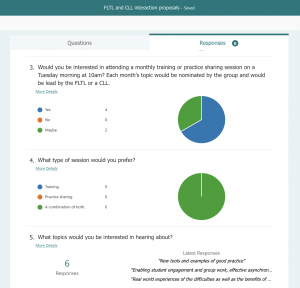
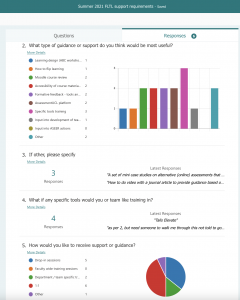
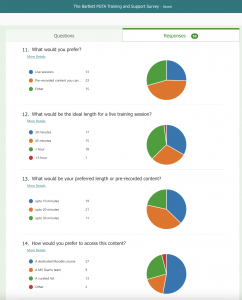
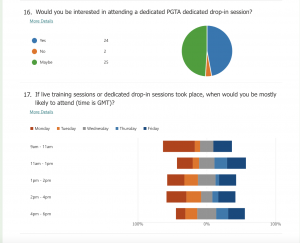
As a result of the survey results the following activities were undertaken:
- Monthly combined Connected Learning How-to and session and show & tell sessions
- Weekly Connected Learning drop-ins were retained
- A Bartlett PGTA Support Moodle course was created
- Weekly Bartleet PGTA drop-in sessions were instated
Bartlett PGTA Support course
The videos included in the Bartlett PGTA Support Moodle course we originally hosted in YouTube. However, as the faculty has a large number of students, in particular from China. The recordings were re-hosted on MediaCentral, UCL’s media streaming service.
Throughout the Moodle course a number of Hot Question activities were added with the purpose of gathering additional feedback on what would be useful.
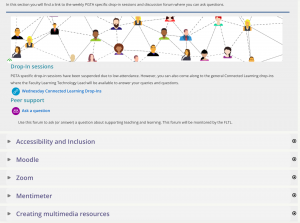
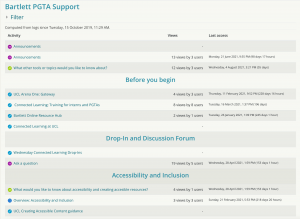
Weekly PGTA only drop-ins were scheduled for 9:30-10:30 on Monday mornings and to take place via Zoom. The drop-ins could only be accessed via the Moodle course. Low enrolment on the Moodle course (34) may account for non-attendance at the drop-in sessions. I enrolment method originally required an enrolment key, this was shared in the Bartlett Bulletin article promoting the course.
Due to the lack of attendees at the PGTA specific drop-in sessions, these were cancelled and students have been referred to the Wednesday afternoon drop-in sessions.
In addition, due to the lack of engagement I have also not been checking the Hot Questions very regularly, and the course is in affect dormant.
Reflection
I have tried to be proactive in supporting colleagues in the faculty, however, an ongoing concern is the low engagement with the weekly drop-ins and monthly how-to sessions. However, faculty colleagues do tend to contact me directly via email or MS Teams for support. This isn’t that surprising as the main preference from staff was for 1:1 support.
As I grow into my role within the faculty I am starting to feel more confident in approaching colleagues and requesting attendance at departmental teaching and student consultative committees. By attending these meetings I believe I will gain a better understanding of the issues colleagues are facing and their successes. Some of this is already shared in the Faculty Teaching Committee, Faculty Education Team and Faculty E-learning meetings that I attend. However, by attending the department meetings I will become known by more colleagues and therefore become a known source of support.